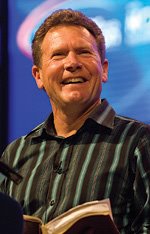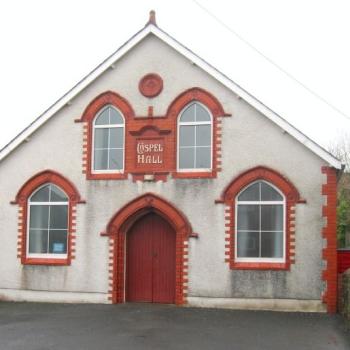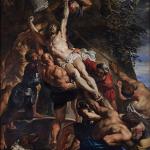In the previous segment of this interview with Rob Rufus, we finished by talking a bit about the network of churches of which he is a part. We ended with Rob speaking about a team of apostles, prophets, evangelists, and pastors/ teachers. Today we begin by asking Rob what he means by “apostles.”
You used that word “apostolic,” and I’m very aware that some of my readers will wonder, “What do you mean by that?” Can you explain your perspective of what that means?
Rob Rufus
Yes, and I think that is a very good question, because people are asking that, and it really is something people want to have clarity on. Often people think apostles are those who write Scripture, and that if we’re claiming we’ve got apostles today, we claim that the canon of Scripture’s not closed. But as we know, it IS closed, and that [New Testament] Scripture was written only by apostles in the first century. So we have pre-ascension apostles in the Bible and post-ascension apostles. Anyone who believes the Bible is God’s inspired Word will realize there must be apostles around today—they’re not pre-ascension apostles. The pre-ascension apostles are the twelve apostles of the Lamb that were called primarily to be witnesses to the baptism of Jesus, his life, his resurrection. But after Jesus was raised from the dead and ascended on high (Ephesians 4) he gave some to be apostles. So there are post-ascension apostles as well, and he says they will be in the earth until the Church comes to the full measure of the stature of Christ. We know the Church is not at the full measure of the stature of Christ currently, so we will need apostles, prophets, evangelists, pastors, and teachers for the equipping of the believers, the saints, for the work of the ministry until we all come to the unity of the faith and the knowledge of the Son of God and to the full measure of the stature of Christ. So apostles need to be “until.” That word “until” offers the key word.
Often people think apostles are those who write Scripture, and that if we’re claiming we’ve got apostles today, we claim that the canon of Scripture’s not closed. But as we know, it IS closed, and that [New Testament] Scripture was written only by apostles in the first century. So we have pre-ascension apostles in the Bible and post-ascension apostles. Anyone who believes the Bible is God’s inspired Word will realize there must be apostles around today—they’re not pre-ascension apostles. The pre-ascension apostles are the twelve apostles of the Lamb that were called primarily to be witnesses to the baptism of Jesus, his life, his resurrection. But after Jesus was raised from the dead and ascended on high (Ephesians 4) he gave some to be apostles. So there are post-ascension apostles as well, and he says they will be in the earth until the Church comes to the full measure of the stature of Christ. We know the Church is not at the full measure of the stature of Christ currently, so we will need apostles, prophets, evangelists, pastors, and teachers for the equipping of the believers, the saints, for the work of the ministry until we all come to the unity of the faith and the knowledge of the Son of God and to the full measure of the stature of Christ. So apostles need to be “until.” That word “until” offers the key word.
Adrian
Yes, very good. I think it’s Matthew Henry who looks at that passage and says something like, “These gifts (or rather some of them) will continue until the end.” It’s an interesting approach, I guess. If the apostles stop, why doesn’t the pastor stop?
Rob Rufus
Exactly! Exactly!
Tope Yes, absolutely. I think you put it very, very well, and in a very helpful way because, certainly I know that for us, just working as we see the Bible order these things functioning together with apostles in the midst and all the other gifts, it’s been an incredible help. Near the end, it does say he gives these as gifts. He must know that we need these gifts. There’s something very powerful there. Every time we align ourselves with the biblical order that God has put in place, goodness and blessing come out the other end. So we’re all learning this.
Yes, absolutely. I think you put it very, very well, and in a very helpful way because, certainly I know that for us, just working as we see the Bible order these things functioning together with apostles in the midst and all the other gifts, it’s been an incredible help. Near the end, it does say he gives these as gifts. He must know that we need these gifts. There’s something very powerful there. Every time we align ourselves with the biblical order that God has put in place, goodness and blessing come out the other end. So we’re all learning this.
Rob Rufus
Very good, Tope! I agree. I agree. I think when people hear of apostles, they kind of think of some sort of hierarchy and almost a controlling dictator-type where apostles are self-appointed and really think they are the big bosses of the church, you know, but actually Paul says, “We, the apostles, come at the end of the line.” There is nothing dictatorial, although Paul was incredibly anointed in such power and theology and revelation, he came amongst the churches like a father—he said almost like a nursing mother to the Thessalonians. And he speaks about of his affection for them and his friendship for them, and the care for the churches. So there is a hierarchy there. But Paul wouldn’t even put the word “apostle” in front of his name. He always put it behind his name: “Paul, called to be an apostle.” He is saying “apostle” is not my title, it’s my job description. So you’ll never see the word “apostle” in front of Paul’s name, or any of the guy’s names. Even at home, I like to say to people, “Look, I’m Rob, called to be a pastor to you.” Pastor is my job description; it’s not my title. People say, “I’ve got to call you “Pastor Rob” because that’s a sign of respect.” And I say, “Well, then, I’ve got to call you Mechanic Henry. Or Housewife Jill.” I don’t show you respect by calling your job description as your title. I think every sincere person who loves the Scriptures—we need to say the Bible plus nothing, the Bible minus nothing—and we build our theology, our church practice—not only our doctrine of Hebrews 6: faith, repentance, you know, all of the doctrine. But the government, the way church is governed, needs to come back to Scripture as well.
Adrian
Yes, and I think that’s so right. It seems like, I guess it’s almost like we have blind spots—where we want the Bible up to this point, but no further. I guess church history is a bit like that—you look back in church history and you see some of these guys in the past, and you think, “How could you see so much great stuff and not this?!”
Rob Rufus
Yes! Very good! Yes! Yes!
Tope
I think the real enemy just tries to blind us and stop us from seeing certain things and living in the good of certain things. But God is still on the throne and seeking to bring recovery to everything.
When you talk about Paul there, and his movement in church planting—you’ve moved now from South Africa and you find you
rself . . . where do you find yourself these days? (Laughter)
Rob Rufus
Well, we planted a church in South Africa and led it for twelve years, handed it over, and then we re-located to Australia to help Dudley, who started the NCMI family of churches and apostolic team. We worked with him there for thirteen years. He actually handed the church over to me and he headed to the United States for awhile—for a number of years—so I led that church for seven years and then handed the church over to Tyrone Daniel, who is Dudley’s son. And then for three years we traveled full-time internationally equipping and training churches in evangelism, and signs and wonders, and doing crusades around the world. And then God spoke very clearly and said, “I want you to go plant a church in Hong Kong,”—which was a real challenge to me because I don’t speak Cantonese or Putonghua, which is Mandarin. But we very clearly heard the call to go. So we started with five people in Hong Kong—no one knew us, knew our history! But God has blessed us here. In three years we have seen local Chinese people saved and added, so we are enjoying it and beginning to move into the China mainland as well and help plant churches in the mainland.
Adrian
Praise God! That’s really great. So, within your family of churches, is that quite an unusual thing to go church planting? I mean, do you just have a few churches or what?
Rob Rufus
We’ve been going from probably the mid-80’s, so it is just over twenty years, and a number of guys and girls together on teams are relocating, planting churches internationally. And more and more we do want it to have a total indigenous flavour. We don’t want it to be—we’re not exporting South African culture that’s for sure! We want it to be Kingdom culture, so when the culture of the country we go to is consistent with the Kingdom culture, those elements of the culture, we say let’s celebrate that. But where the culture contradicts the culture of the Kingdom, then the Christians need to make the adjustments to conform to the culture of the Kingdom. So, yeah, there is that spearheading—more and more people going into different nations and planting, but we also kind of plant and parent. There are churches out there going—we really need to be connected with an apostolic team that can help us build foundation into the life of our churches We never own those churches, but work as friends with those churches through the invitation of the leaders— only through invitation of the leaders. There is no headquarters that says, “We own you and you’re just another statistic. If you don’t line up with us, then we’ll take your building, kick you out”—none of that! We don’t own any buildings. The local church is the highest governing authority; they own their buildings. We build friendship with them and relationship, so we also have had, over those twenty years, probably (we don’t know, you gotta be careful) I’m going to say some thousands of churches, but that represents throughout most of Africa, we have churches. In one year we had 500 churches planted in Malawi alone, but it just happens in Africa. It just happens. But in the Western world, no, we don’t have thousands; we’re talking hundreds in the Western world.
Continued in part 5 . . .















